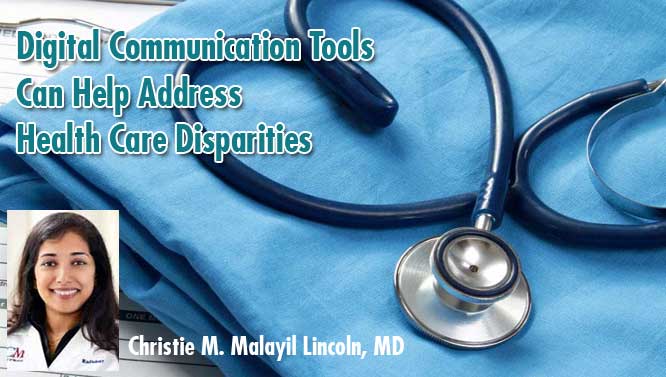
According to the World Health Organization, “the social determinants of health are the conditions in which people are born, grow, live, work and age. These circumstances are shaped by the distribution of money, power and resources at global, national and local levels.” Access to health systems also influence individuals and population.
Health care disparities are seen in chronic medical conditions like heart disease, diabetes, and chronic arthritis in lower socioeconomic populations.
Rectifying health care disparities are championed by physicians, especially primary care doctors, nurses, social service providers and other medical professionals through individual and community education and community outreach.
In fact, you do not need to have a medical education to provide outreach - it just requires that you care. There are two primary goals of health equity endorsement: social obligation and benefit to the US economy. As President Franklin Delano Roosevelt said, “The test of our progress is not whether we add more to the abundance of those who have much, it is whether we provide enough for those who have little.”
In order to address the social determinants of health requires thinking in a novel way and requires a concerted effort of diverse people and stakeholders, who have collectively different life experiences.
Some of you are probably wondering how a radiologist can play a role in furthering health equity. Information technology is at the heart of radiology’s daily practice, and employing technology through decision support tools like Radiology Support, Communication, and Alignment Network (R-SCAN) is where radiology can play a significant role on the health care team.
In radiology, addressing health care disparities means putting special emphasis on reducing unnecessary tests, while generating financial savings. This aligns with one of the aims of Transforming Clinical Practice Initiative, a Centers for Medicare and Medicaid Services (CMS)-funded program designed to empower clinicians to expand their quality improvement capacity.
R-SCAN is a free, online, CMS Innovation funded, informational instrument that cultivates increased communication between radiologists and referring health care providers in advanced imaging appropriateness of patients in both the outpatient and emergency settings.
This online software has an ever-expanding list of Choosing Wisely topics, with the goal of increasing quality of care by removing inappropriate imaging and by decreasing costs to health care systems.
At Baylor College of Medicine’s affiliate institution, Harris Health System (HHS), I along with several trainees collaborated with primary care physicians at a few HHS outpatient clinics on a low back pain and MRI lumbar spine utilization wherein we successfully reduced inappropriate MRI lumbar spine imaging in our patient population. HHS is a public health system that serves a population comprised of 59.4% Hispanics and 25.1% African Americans and in which 60.1% are uninsured and 20.6% are covered by Medicaid.
The family medicine physicians at Harris Health-Baylor College of Medicine were receptive to our overture for constructive collaboration, and thus translated the project into a successful, collaborative, health equity venture. As I think back to my years of radiology training, I recall my mentor, Dr. Jacqueline A Bello, always stating that collaboration with our clinical colleagues is the key to the best outcomes of our patients and that stays in my heart as I practice radiology today.

Comments





